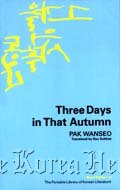Trauma and ethics
Three Days in That Autumn
By Park Wan-suh
(Jimoondang, 5,000 won)

Among the many Korean novels dealing with the Korean War (1950-1953), Park Wan-suh’s “Three Days in That Autumn” tells a rare and original account of a female protagonist who tries to overcome her personal trauma while faced with ethical questions surrounding her profession.
Raped and pregnat with an unwanted child during the war, the protagonist, now in her 50s, has had an abortion. She became a gynecologist after the war with a solid purpose, and has been performing only abortions at her clinic for the past 30 years.
Suffering from her own traumatic past, the protagonist feels hatred toward the unborn babies of her patients. Firmly convinced that she is freeing women from the agony of unwanted pregnancies, she finds pleasure in aborting countless numbers of fetuses on a daily basis.
But in her final three days of work before her retirement, she finds herself desperately wanting to assist childbirth, not abortion, for the very first time in her life. She asks the landlord of the building in which her clinic is located if she can deliver the baby of his pregnant daughter-in-law. He refuses, calling her a “butcher,” not a doctor.
On her last day of work, she performs her last abortion on a young woman in her late teens. After the procedure, the protagonist holds the eight-month-old fetus and frantically runs to a big hospital -- that houses incubators for premature babies -- in the hope of saving its life. The fetus dies the minute she arrives at the hospital.
Seized by despair, she returns home and buries the dead baby in her own garden. She spreads moss rose seeds around the baby’s grave, finding herself longing for self-healing and redemption for her past.
Born in 1931 in Gaepyeong-gun, Gyeonggi Province, in what is now North Korea, Park became a housewife-turned-novelist at the age of 40 when her novel “Namok,” or “Bare Tree,” won a contest organized by a women’s magazine.
Her works often feature ordinary families and women in the aftermath of the Korean War. She won many literary awards including the Yi Sang Literary Award and the Korean Literature Award.
Park died of gallbladder cancer in January. She was 80.
(clairelee@heraldcorp.com)
Three Days in That Autumn
By Park Wan-suh
(Jimoondang, 5,000 won)

Among the many Korean novels dealing with the Korean War (1950-1953), Park Wan-suh’s “Three Days in That Autumn” tells a rare and original account of a female protagonist who tries to overcome her personal trauma while faced with ethical questions surrounding her profession.
Raped and pregnat with an unwanted child during the war, the protagonist, now in her 50s, has had an abortion. She became a gynecologist after the war with a solid purpose, and has been performing only abortions at her clinic for the past 30 years.
Suffering from her own traumatic past, the protagonist feels hatred toward the unborn babies of her patients. Firmly convinced that she is freeing women from the agony of unwanted pregnancies, she finds pleasure in aborting countless numbers of fetuses on a daily basis.
But in her final three days of work before her retirement, she finds herself desperately wanting to assist childbirth, not abortion, for the very first time in her life. She asks the landlord of the building in which her clinic is located if she can deliver the baby of his pregnant daughter-in-law. He refuses, calling her a “butcher,” not a doctor.
On her last day of work, she performs her last abortion on a young woman in her late teens. After the procedure, the protagonist holds the eight-month-old fetus and frantically runs to a big hospital -- that houses incubators for premature babies -- in the hope of saving its life. The fetus dies the minute she arrives at the hospital.
Seized by despair, she returns home and buries the dead baby in her own garden. She spreads moss rose seeds around the baby’s grave, finding herself longing for self-healing and redemption for her past.
Born in 1931 in Gaepyeong-gun, Gyeonggi Province, in what is now North Korea, Park became a housewife-turned-novelist at the age of 40 when her novel “Namok,” or “Bare Tree,” won a contest organized by a women’s magazine.
Her works often feature ordinary families and women in the aftermath of the Korean War. She won many literary awards including the Yi Sang Literary Award and the Korean Literature Award.
Park died of gallbladder cancer in January. She was 80.
(clairelee@heraldcorp.com)


















![[Today’s K-pop] Treasure to publish magazine for debut anniversary](http://res.heraldm.com/phpwas/restmb_idxmake.php?idx=642&simg=/content/image/2024/07/26/20240726050551_0.jpg&u=)